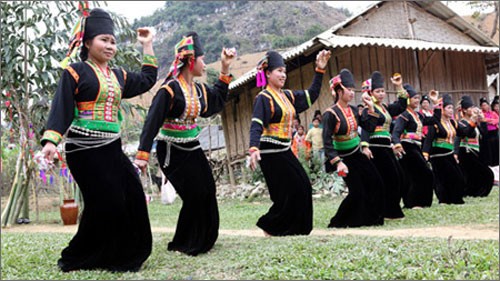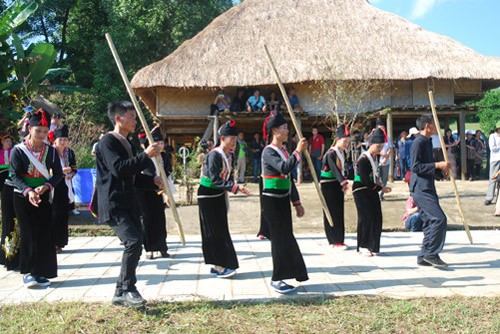(VOVworld) – The Kho Mu live in Vietnam’s northern mountain region together with other ethnic minority groups. Today’s “Colorful Vietnam, Vietnam’s 54 ethnic groups” segment begins a series of stories about the Kho Mu.

Kho Mu women |
The Khơ Mú are also called the Xá Cẩu, Mứn Xen, Pu Thênh, Tềnh, or Tày Hạy. About 100 years ago, the Khơ Mú settled in the northern Vietnamese provinces of Son La, Lai Chau, and Nghe An. Dozens of houses cluster in hamlets high in the mountains. Customarily, each clan takes the name of an animal or plant as its family name.
Building a house is an important job and a housewarming ceremony is the happiest event in any hamlet. The house’s owner prepares a party to treat his fellow villagers, who sing and dance to celebrate the happy event.
The Kho Mu live in stilt houses, which are often built on a narrow, precarious spot. The interior decoration and arrangement reflect Kho Mu culture and beliefs. Researcher of ethnic culture Doctor Vi Van An of the Museum of Ethnology, says: “The Kho Mu live mainly in Nghe An province and scatteried in Son La, Lai Chau, and Thanh Hoa province. The kitchen shows the most typical cultural features of the Kho Mu. They keep an eternal flame in the kitchen which represents prosperity. The fire carries the bonds between the ancestors and the descendants.”
 |
| A performance revitalizes the customs of digging holes to saw seeds of the Kho Mu |
The Kho Mu live close to nature. They grow corn, sweet potatoes, cassavas, and rice on terraced fields. They use simple farm tools such as knives, axes, and sticks to dig holes for planting seeds. They raise cattle and poultry to provide meat for rituals and festivals. The Kho Mu weave bamboo and rattan containers to carry goods and store food. They neither weave fabric nor make clothes. They buy clothes made by the Black Thai.
For marriage, Kho Mu parents respect their children’s wishes. The husband and wife have equal status in the family. After marriage, the couple stays with the wife’s family for one year. Then they move in with the husband’s family. Bui Minh The, a research of Kho Mu culture, says: “The Kho Mu have two important rituals annually. After the New Year festival, all family members gather to pray to their ancestors to bless them throughout the year. A second ritual is performed in the 6th lunar month to bless the harvest and a new crop.”
The Kho Mu have developed a number of folk singing genres, dances, and story-telling epics. They have also produced musical instruments made from readily available materials such as bamboo and leaves. The Kho Mu have preserved their distinctive customs and lifestyle, which always makes a profound impression on visitors.